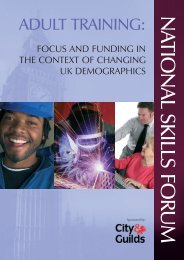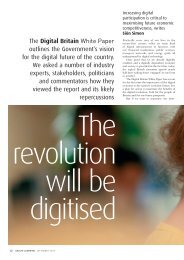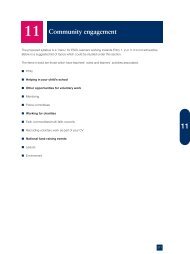NIACE Briefing Sheet 11: Emancipatory Learning [PDF]
NIACE Briefing Sheet 11: Emancipatory Learning [PDF]
NIACE Briefing Sheet 11: Emancipatory Learning [PDF]
- No tags were found...
Create successful ePaper yourself
Turn your PDF publications into a flip-book with our unique Google optimized e-Paper software.
<strong>Emancipatory</strong> <strong>Learning</strong>The radical tradition in adult learning isconcerned with how learning, knowledgeand education can be used to assistindividuals and groups to overcomeeducational disadvantage, combat socialexclusion and discrimination, and challengeeconomic and political inequalities - with aview to securing their own emancipation andpromoting progressive social change.This is the eleventh in a series of briefingsheets which aim to provide an introductionto a variety of lifelong learning issuesAlso available:1. A history of the development of <strong>NIACE</strong>2. What motivates people to learn3. Student non-completion (drop out)4. Who learns - key facts5. Family learning6. Lifelong learning - opportunities andinitiatives7. New Deal8. <strong>Learning</strong> centres9. Young adult learners, disaffection andsocial exclusion10. Social exclusion<strong>11</strong>. <strong>Emancipatory</strong> learning12. Fees charged to part-time adultstudents 1998-99Suggestions for future issues to be coveredare welcome.Copies of this and other sheets are availablefrom <strong>NIACE</strong>, 21 De Montfort Street,Leicester LE1 7GE.Tel. No. 0<strong>11</strong>6 2044 261E-mail: information@niace.org.ukThey are also available on the website atwww.niace.org.ukIf you require a different format - e.g. alarge print version please let us know.What is <strong>Emancipatory</strong> <strong>Learning</strong>?<strong>Emancipatory</strong> learning is not concerned withstrategies for personal self improvement via anundue emphasis on academic qualifications by wayof ladders of individualised opportunity. Its purposeis to develop understanding and knowledge aboutthe nature and root causes of unsatisfactorycircumstances in order to develop real strategies tochange them.The kinds of knowledge, pedagogy and educationalrelationships encouraged by emancipatorylearning are those which are formed in solidaritywith the interests of the least powerful in society.The reason for collaboration is to work with theleast powerful to gain more autonomy andindependence, more control over their own lives,and to bring about change in the interests of greaterequality and social justice.<strong>Emancipatory</strong> learning is relevant today becauseof the stark realities of increased material povertyand inequalities - not simply within societies butalso between societies in the context ofglobalization. This includes growing inequalities ofincome and wealth , massive inequalities in relationto cultural recognition and social diversity, andhuge inequalities arising out of access toinformation. In Britain there is a widening dividebetween those who are highly educated, skilled andwell paid specialists; those who are less skilled butcurrently employed; and those - about one third ofthe population - who are poorly educated, poorlyqualified, casualised, unwaged and unemployed(Hutton 1995).In this context, adult educators have a choice - ifthey do not take the side of the poor and powerless,then, by default, they contribute to preserving thestatus quo on the side of the rich and privileged. Forthose who want to contribute to creating a moreinformed, egalitarian and socially just society, theideas and practices associated with emancipatorylearning may be a place to start (Martin 2000).<strong>NIACE</strong> <strong>Briefing</strong> <strong>Sheet</strong> <strong>11</strong> March 2000
<strong>Emancipatory</strong> learning is associated - in theliterature of adult education - with some other,related ideas: for example, Really UsefulKnowledge, Critical Thinking, Conscientisation,and Transformation. These are all ideas whichcome together in the campaign for PopularEducation.Really Useful KnowledgeThis idea dates back to the nineteenth century inBritain and to struggles for working class educationand the vote (Johnson 1979). It is relevant today insupporting the interests of disadvantaged andoppressed groups and members of progressivesocial movements - including people withdisabilities, women, working class people andethnic minorities. It is concerned withdistinguishing between ‘merely useful knowledge’– the kind of knowledge that keeps people in theirplace and supports the status quo, and ‘reallyuseful’ knowledge that enables people to bothunderstand the root causes of the circumstances inwhich they find themselves in order to makechanges.Really useful knowledge is created whenindividuals and groups begin to reflect upon theirexperience with each other, in ways that lead togreater insight and understanding, and which enabletheories to be developed linked to strategies forbringing about changes.Really useful knowledge assumes that people canlearn a lot from their own and other people’sexperience of common problems and struggles -enough to develop theories and explanations -which can then inform social action for change. Theknowledge might be political, emotional orpractical. It does not imply learning to put up withunsatisfactory circumstances, it implies getting outfrom under (Thompson 1997, 2000).Critical ThinkingCritical thinking assumes that people can beinvolved in ‘making things happen’ rather thanhave things happen to them. Critical thinking as abasis for learning is the antithesis of rote learning,basic training and behaviour modification - none ofwhich imply the critical engagement of learners ininitiating and evaluating ideas. It assumes that allpeople - whatever their intelligence or ability - mustengage in the wider world if they are to survive in itand help to reconstitute it. Information produced byspecialists - including government, the media,scientists, educationalists, economists – should notbe regarded as the property of specific groups butsomething which is routinely interpreted and actedupon by all of us in the course of our everydayactions.Critical thinking is the kind of thinking whichchallenges fatalism, prejudice, apathy andindoctrination. The aim is to engage active citizensin informed participation in social and political lifeto achieve a more equitable and socially justdemocracy. Critical thinking is not simplyconcerned with overcoming individual and group‘ignorance’ but with encouraging ways of thinkingthat are critical of the kind of status quo whichsupports inequalities, injustices and the abuse ofpower (Mayo 1997).ConscientisationThis is a term associated with the Brazilian adulteducator Paulo Freire and relates to thedevelopment of critical consciousness as a form ofemancipatory learning. Freire’s approach - firstused with literacy students - is based on askingquestions about the root causes of social andpolitical problems rather than focusing on thesymptoms - in order to plan strategies to addressthem. According to Freire, oppressed (excluded)people need to develop critical consciousness inorder to challenge the ideas of dominant groupswho are their oppressors. They need to be able tocritically assess the kinds of ideas, contexts andrelationships which are usually ‘taken for granted’or accepted as inevitable, in order to question theroot causes of their oppression (Freire 1970).Through the process of conscientisation, ordeveloping critical consciousness, excluded groupscan learn to identify, interpret, criticise and finallytransform the world about them. Crucial to thisprocess is the notion of praxis - by which Freiremeans ‘reflection and action upon the world inorder to change it’. More simply, it means beingable to make the connection between experience,understanding and social action to bring aboutsocial change. It is a process which people must dofor themselves because liberation or emancipationcannot be handed down from above. It must comefrom the bottom up.<strong>NIACE</strong> <strong>Briefing</strong> <strong>Sheet</strong> <strong>11</strong> March 2000
Through the process of conscientisation the poorbegin to replace the inevitability of their ownoppression by developing autonomy, independence,responsibility and - he says - fuller humanity. Inpractice this means shedding the kinds of pejorativelabels that are regularly attached to minority andexcluded groups by dominant groups and which canbecome internalised - for example, apathetic, lazy,scroungers, irresponsible, unreliable, etc. Instead ofgoing along with the ‘conventional wisdoms’prescribed by oppressors and internalising them,minority groups can begin to see themselves in anew light as inherently capable and creative.Freire is very critical of what he calls ‘the bankingapproach’ to education in which teachers ( ortrainers) down-load information into learners as ifthey are empty vessels. This places the learners inessentially passive roles. Banking education leadsto the domestication of learners by imposing views- however worthwhile - from above in ways that donot lead to their independence or emancipation. Theapproach promoted by conscientisation aims toencourage learners to become actively engaged inidentifying problems, asking questions, makinganalyses and working out strategies fortransformation for themselves. The teacher’s role isthat of an equal partner who engages in dialoguewith learners in the spirit of democratic enquiry andsolidarity.TransformationTransformation is associated with bottom up andpeople centred education and developmentstrategies, in which the intention is to make changesto the kinds of social, political, personal andcultural relations in society which are currentlybased on inequality, exploitation or oppression. Inthis sense ‘the outcomes’ of emancipatorylearning for transformation are expected toinclude individuals and groups becomingsufficiently aware, well informed and activelyinvolved in ‘fighting back’ against thecircumstances, conditions, ideas and powerdifferences that operate as barriers to equality andsocial justice. Transformation is likely to be mosteffective and sustainable when it is pursued insolidarity with others engaged in the same kinds ofstruggles (Foley 1999).Popular EducationPopular education is concerned with how adulteducation can contribute to popular struggles fordemocracy, social justice and equality. A vitalcomponent is the commitment to dialogue betweenpeople as a way of making the kinds of knowledgethat can usefully make a difference. Teachers andlearners are viewed as equal partners in the learningprocess, committed to fully democratic relations, inpursuit of an actively democratic wider society.Popular education is not simply populisteducation. It involves emancipatory learningrooted in the real interests and struggles of ordinarypeople. Popular education is overtly politicaleducation which is critical of the status quo and iscommitted to progressive social and politicalchange. It has nothing to do with ‘helping thedisadvantaged’ or ‘the management of poverty’,and everything to do with assisting in the strugglefor a more democratic, just and egalitarian society(Martin et al 1999).Like really useful knowledge, critical thinkingand conscientisation, popular education finds itscurriculum in the struggles, the life experiences andthe material interests of those who are the leasteconomically, socially, culturally and politicallypowerful in society. Pedagogy is more likely to befocussed on collective and group learning ratherthan individualised learning - in order to reflectcommon struggles, repair damaged solidarities andbuild new ones. Wherever possible, links are madebetween education and social action (Crowther,Martin and Shaw 1999).Adult <strong>Learning</strong> for a ChangeIn many ways the language of emancipation,oppression and solidarity may seem a little oldfashioned in Tony Blair’s New Britain, in which noone talks about social class very much any more,and opportunities are assumed to exist for all thosewho want to make the most of what is available.For those who are nonetheless ‘disadvantaged’ or‘socially excluded’ - i.e.poor, ill educated,unqualified, unwaged and dependent on benefits - anumber of government schemes, linked toeducation and training, are in place to get people offwelfare and into work. Adult and communityeducators and trainers are likely to find themselves<strong>NIACE</strong> <strong>Briefing</strong> <strong>Sheet</strong> <strong>11</strong> March 2000
working with poor people in a range of formal andnon formal settings. In many cases, those in mosturgent need of educational support are the leastlikely to be involved in formal provision.It is clear that education - on its own - cannotchange societies in which there are economic andclass systems which encourage vast discrepanciesof wealth and access to resources, including accessto information. But education can play a part inassisting people in their various struggles againstdiscrimination, exploitation, inequalities and socialinjustices, and can make a real difference to peopleslives when heightened awareness gets connected toincreased understanding and joint action to bringabout changes. <strong>Emancipatory</strong> learning isparticularly relevant in community developmentand community based learning; workplace learningand trade union education; educational work withwomen, ethnic minorities, user groups and basiceducation. However, the view that learning shouldplay a part in sustaining progressive social change -not simply personal self development - means thatall kinds of learning can include emancipatorycommitments. The challenge facing teachers - inpartnership with learners - is how to include thecommitment to emancipatory learning and practiceacross a wide range of subject areas and educationalsettings (Thompson 2000)Jane Thompson.References and Further ReadingA meeting of minds. Martin et al (1999), in Adults<strong>Learning</strong>, Vol 10, No 9, 1999. ISSN 09552308Talking with dinosaurs. Ian Martin in Adults<strong>Learning</strong>, Vol <strong>11</strong>, No 5, 2000. ISSN 09552308Imagining tomorrow: adult education fortransformation. Marjorie Mayo. Leicester:<strong>NIACE</strong>, 1997. ISBN 1862010064<strong>Learning</strong> in social action. Griff Foley. London:Zed and Leicester: <strong>NIACE</strong>, 1999. ISBN1862010676Pedagogy of the oppressed. Paulo Freire.Harmondsworth: Penguin, 1970. ISBN 0140803319The state we’re in. Will Hutton. London: Cape,1995. ISBN 0224036882Women, class and education. Jane Thompson,London: Routledge, 2000Words in edgeways: radical learning for socialchange. Jane Thompson. Leicester: <strong>NIACE</strong>, 1997.ISBN 1862010137“Really useful knowledge”: radical education andworking class culture. Richard Johnson in Clarke,Crichter and Johnson (eds) Working class culture:studies in history and theory, London:Hutchinson, 1979<strong>NIACE</strong>, the National Institute of Adult Continuing Education, hasa broad remit to promote lifelong learning opportunities for adults.<strong>NIACE</strong> works to develop increased participation in education andtraining. It aims to do this for those who do not have easy accessbecause of barriers of class, gender, age, race, language andculture, learning difficulties or disabilities, or insufficientresources.Registered charity number 1002775; Company registrationnumber 2603322<strong>NIACE</strong> <strong>Briefing</strong> <strong>Sheet</strong> <strong>11</strong> March 2000


![NIACE Briefing Sheet 11: Emancipatory Learning [PDF]](https://img.yumpu.com/48109261/1/500x640/niace-briefing-sheet-11-emancipatory-learning-pdf.jpg)
![NIACE Briefing Sheet2: What motivates people to learn [PDF]](https://img.yumpu.com/51410634/1/184x260/niace-briefing-sheet2-what-motivates-people-to-learn-pdf.jpg?quality=85)
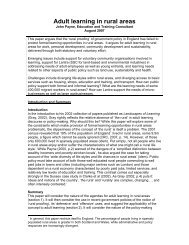
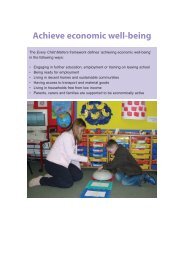
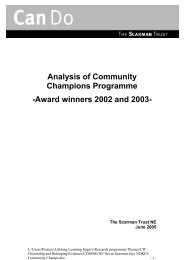
![Section 11: Volunteering and citizenship - [PDF File] - Niace](https://img.yumpu.com/49993701/1/190x255/section-11-volunteering-and-citizenship-pdf-file-niace.jpg?quality=85)

![credit card leaflet - [PDF] - Niace](https://img.yumpu.com/49256644/1/190x245/credit-card-leaflet-pdf-niace.jpg?quality=85)
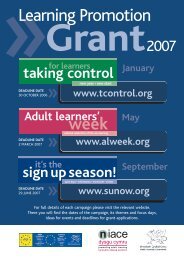
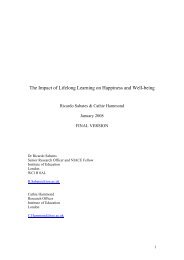
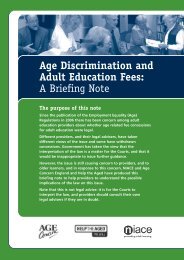
![Ice-breakers and other suggestions for your media club - [PDF] - Niace](https://img.yumpu.com/45206918/1/190x245/ice-breakers-and-other-suggestions-for-your-media-club-pdf-niace.jpg?quality=85)
